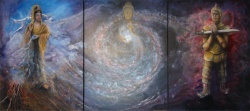Difference between revisions of "Heart of Prajna Paramita Sutra"
| Line 9: | Line 9: | ||
[[Shariputra]], all [[dharmas]] are [[empty]] of [[characteristics]]. They are not produced. Not destroyed, not {{Wiki|defiled}}, not [[pure]], and they neither increase nor {{Wiki|diminish}}. Therefore, in [[emptiness]] there is no [[form]], [[feeling]], [[cognition]], formation, or [[consciousness]]; no [[eyes]], {{Wiki|ears}}, {{Wiki|nose}}, {{Wiki|tongue}}, [[body]], or [[mind]]; no sights, {{Wiki|sounds}}, {{Wiki|smells}}, {{Wiki|tastes}}, [[objects]] of {{Wiki|touch}}, or [[dharmas]]; no field of the [[eyes]], up to and including no field of [[mind-consciousness]]; and no [[ignorance]] or ending of [[ignorance]], up to and including no [[old age]] and [[death]] or ending of [[old age]] and [[death]]. There is no [[suffering]], no accumulating, no [[extinction]], no way, and no [[understanding]] and no [[attaining]]. | [[Shariputra]], all [[dharmas]] are [[empty]] of [[characteristics]]. They are not produced. Not destroyed, not {{Wiki|defiled}}, not [[pure]], and they neither increase nor {{Wiki|diminish}}. Therefore, in [[emptiness]] there is no [[form]], [[feeling]], [[cognition]], formation, or [[consciousness]]; no [[eyes]], {{Wiki|ears}}, {{Wiki|nose}}, {{Wiki|tongue}}, [[body]], or [[mind]]; no sights, {{Wiki|sounds}}, {{Wiki|smells}}, {{Wiki|tastes}}, [[objects]] of {{Wiki|touch}}, or [[dharmas]]; no field of the [[eyes]], up to and including no field of [[mind-consciousness]]; and no [[ignorance]] or ending of [[ignorance]], up to and including no [[old age]] and [[death]] or ending of [[old age]] and [[death]]. There is no [[suffering]], no accumulating, no [[extinction]], no way, and no [[understanding]] and no [[attaining]]. | ||
| − | Because nothing is attained, the [[Bodhisattva]], through reliance on [[prajna paramita]], is unimpeded in his [[mind]]. Because there is no impediment, he is not afraid, and he leaves distorted dream-thinking far behind. Ultimately [[Nirvana]]! | + | Because nothing is [[attained]], the [[Bodhisattva]], through reliance on [[prajna paramita]], is unimpeded in his [[mind]]. Because there is no impediment, he is not afraid, and he leaves distorted dream-thinking far behind. Ultimately [[Nirvana]]! |
| − | All [[Buddhas]] of the three periods of [[time]] attain [[Anuttarasamyaksambodhi]] through reliance on [[prajna paramita]]. Therefore, know that [[prajna paramita]] is a great [[spiritual]] [[mantra]], a great bright [[mantra]], a supreme [[mantra]], an unequalled [[mantra]]. It can remove all [[suffering]]; it is genuine and not false. That is why the [[mantra]] of [[prajna paramita]] was spoken. Recite it like this: | + | All [[Buddhas]] of the [[three periods]] of [[time]] attain [[Anuttarasamyaksambodhi]] through reliance on [[prajna paramita]]. Therefore, know that [[prajna paramita]] is a great [[spiritual]] [[mantra]], a great bright [[mantra]], a supreme [[mantra]], an unequalled [[mantra]]. It can remove all [[suffering]]; it is genuine and not false. That is why the [[mantra]] of [[prajna paramita]] was spoken. Recite it like this: |
Gate gate paragate parasamgate [[bodhi]] [[svaha]]! | Gate gate paragate parasamgate [[bodhi]] [[svaha]]! | ||
Revision as of 16:48, 2 September 2014
The Heart of Prajna Paramita Sutra
Translated by Tang Dharma Master of the Tripitaka Hsüan-Tsang on imperial command.
When Avalokiteshvara Bodhisattva was practicing the profound prajna paramita, he illuminated the five skandhas and saw that they are all empty, and he crossed beyond all suffering and difficulty.
Shariputra, form does not differ from emptiness; emptiness does not differ from form. Form itself is emptiness; emptiness itself is form. So, too, are feeling, cognition, formation, and consciousness.
Shariputra, all dharmas are empty of characteristics. They are not produced. Not destroyed, not defiled, not pure, and they neither increase nor diminish. Therefore, in emptiness there is no form, feeling, cognition, formation, or consciousness; no eyes, ears, nose, tongue, body, or mind; no sights, sounds, smells, tastes, objects of touch, or dharmas; no field of the eyes, up to and including no field of mind-consciousness; and no ignorance or ending of ignorance, up to and including no old age and death or ending of old age and death. There is no suffering, no accumulating, no extinction, no way, and no understanding and no attaining.
Because nothing is attained, the Bodhisattva, through reliance on prajna paramita, is unimpeded in his mind. Because there is no impediment, he is not afraid, and he leaves distorted dream-thinking far behind. Ultimately Nirvana!
All Buddhas of the three periods of time attain Anuttarasamyaksambodhi through reliance on prajna paramita. Therefore, know that prajna paramita is a great spiritual mantra, a great bright mantra, a supreme mantra, an unequalled mantra. It can remove all suffering; it is genuine and not false. That is why the mantra of prajna paramita was spoken. Recite it like this:
Gate gate paragate parasamgate bodhi svaha!

